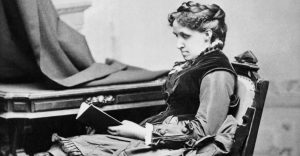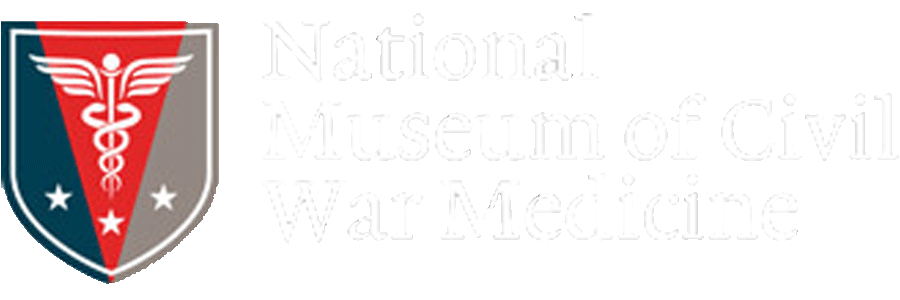Table of Contents
Rachel Williams
 It was November 1862. Louisa May Alcott had just turned thirty, and she had spent much of that year reluctantly teaching kindergarten. Her family was in dire financial straits, and she had failed to earn a profit from the few short stories she had sold that year. So she made a decision: she would go to Washington to serve as a nurse. Her absence would mean one less mouth for her family to feed, and besides, she wrote in her journal, “help needed…and must let out my pent-up energy in some new way.”
It was November 1862. Louisa May Alcott had just turned thirty, and she had spent much of that year reluctantly teaching kindergarten. Her family was in dire financial straits, and she had failed to earn a profit from the few short stories she had sold that year. So she made a decision: she would go to Washington to serve as a nurse. Her absence would mean one less mouth for her family to feed, and besides, she wrote in her journal, “help needed…and must let out my pent-up energy in some new way.”
Louisa’s father, the prominent educator, philosopher, and abolitionist Bronson Alcott, held his four daughters to high educational and moral standards, and Louisa, as a result, was as serious-minded as she was witty. She was determined to prove her worth. Although anxious about her upcoming service, Louisa was confident that the adventure would do her good – “whether I come out alive or dead.”
So, armed with a glowing recommendation from Hannah Stevenson, a respected nurse, and “full of hope and sorrow, courage and plans,” she departed her home in Concord, MA for Washington in December 1862.
Louisa the Nurse
Once in Washington, Louisa threw herself into her work at the Union Hotel hospital in Georgetown. Just as for many of her fellow nurses, her days were a tiring whirlwind of dressing wounds, cleaning and sewing bandages, supervising convalescent assistants, fetching bed linens, water, and pillows, assisting during surgical procedures, sponging filthy, broken bodies (a shocking experience for an unmarried lady!), writing letters on behalf of the sick and injured, and feeding those too weak to feed themselves.
Being, as she wrote, a “red hot Abolitionist,” she – like Mary Phinney – was less than happy at the prospect of being asked to care for Confederate soldiers. When one injured Rebel was brought in, she privately resolved “to put soap in his eyes, rub his nose the wrong way, and excoriate his cuticle generally.” Louisa showed no remorse for her partisan sentiments, but she was deeply fond of her Union patients, writing:
Though often home sick, heart sick & worn out, I like it – find real pleasure in comforting tending & cheering these poor souls who seem to love me, to feel my sympathy though unspoken, & acknowledge my hearty good will in spite of the ignorance, awkwardness, & bashfulness which I cannot help showing in so new & trying a situation.
One patient in particular caught Louisa’s attention: John Suhre, a blacksmith who was admitted, badly wounded, after the defeat of Ambrose Burnside’s forces at Fredericksburg. She was moved by the quiet dignity with which he faced his rapidly-approaching death, impressed by his simple devotion to his mother, and was drawn to a face she described as “most attractive” and “comely featured.” When the hospital surgeon gave her the task of telling John that his wound was a fatal one, Louisa struggled to compose herself. “Such an end seemed very hard for such a man,” she later wrote, “The army needed men like John, earnest, brave, and faithful; fighting for liberty and justice with both heart and hand, true soldiers of the Lord.”
Hospital Sketches
For Louisa, nursing was not just an exciting and liberating opportunity for an unmarried woman who confessed to longing for battle “like a warhorse when he smells powder;” it was also an unparalleled chance to gather material for her budding career as a writer. The Civil War provided Louisa with important real-life experiences and memories – many of which would inform her most beloved work, Little Women (1868). The war drove her to hone her style and skill as a writer, and brought her first significant taste of acclaim and commercial success.
Louisa used her letters home to her family as the inspiration for Hospital Sketches, a series of lightly-fictionalised narratives of life as a Civil War nurse, first serialised in the Boston-based Commonwealth in May and June of 1863 and published later that year in one collection by James Redpath. In Hospital Sketches, Louisa introduced her alter ego, Nurse Tribulation Periwinkle, and the chaotic “Hurly-Burly House” where she worked. “Nurse Trib” recounted her altercations with arrogant and old-fashioned surgeons who resented the interference of an untrained female interloper, and recalled warm friendships and rewarding working partnerships with others. She captured the topsy-turvy bustle of Washington, crowded with soldiers and “contrabands,” and the eerie quiet of the hospital at night.
Louisa’s Health
Just a few weeks into her service, Louisa confessed in her journal that “bad air, food, water, work & watching are getting to be too much for me.” The Union Hotel was a grim, dirty place crowded with patients and medical workers. “A more perfect pestilence-box than this house I never saw,” was Louisa’s disparaging assessment. Louisa’s attempts to keep the place well-ventilated – inspired by her admiration of Florence Nightingale’s techniques and innovations – were often futile. The diet for patients and workers alike – consisting of “the inevitable fried beef, salt butter, husky bread & washy coffee” – was repetitive, unhealthy, and stodgy; a far cry from the ascetic vegetarian diet her father Bronson encouraged his family to follow. Louisa worked twelve-hour shifts, often taking the night watch, and the gruelling schedule soon began to take its toll.
By mid-January she was unable to continue with her nursing duties, and was confined to her room, diagnosed with typhoid pneumonia. She was zealously dosed with calomel, a poisonous mercury compound widely used during the Civil War. Her condition worsened, and she slipped in and out of consciousness, haunted by alarming hallucinations – including one vivid fever dream in which she was stoned and burned for being a witch. The hospital doctors, Army Superintendent of Nurses Dorothea Dix, and her fellow nurses all tried to convince her to return home. Eventually, the hospital matron telegraphed Bronson Alcott, who hurried to fetch his gravely ill daughter. Louisa was too weak to protest; her career as a Civil War nurse was over.
A combination of the rigours of Louisa’s nursing service, her serious illness, and the treatment she received, profoundly affected her health. She was never fully well thereafter. Trying to alleviate the chronic pain she suffered, she experimented throughout her life with a range of homeopathic remedies, from massages and electromagnetism to hydropathic baths and mind cure – all to little effect. She died in 1888 at the age of just 55. Her words, and her beloved characters, however, live on.
About the Author
Rachel Williams teaches courses on the Civil War and the antebellum period at the University of Nottingham, UK. She is currently working on a book about Civil War relief agencies and evangelical reform.


